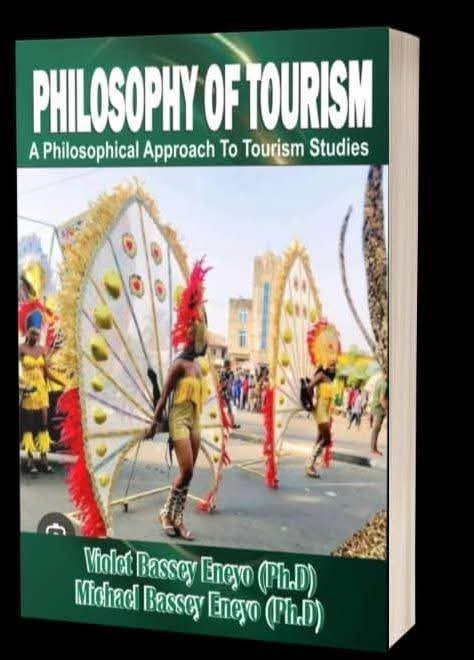PHILOSOPHY OF TOURISM?
Are you a tourism student or a tourism lecturer? Are you a tourist or a tour guard? Have you ever participated in carnival planning? Do you want to understand the tourism industry succinctly or are you ready to know about philosophy of tourism? Then, there is good news for you.
Mrs Violet Eneyo (Ph.D) and Michael Eneyo (Ph.D) are up to quench your hunger for understanding this concept and how you can develop it for a proper utilisation.
CHAPTER ONE
UNDERSTANDING THE CONCEPT OF PHILOSOPHY
1.0 Introduction
Philosophy, often described as the “love of wisdom,” is derived from the Greek words philo, meaning “love,” and sophia, meaning “wisdom.” This field embodies more than just a passion for
knowledge; it represents a rigorous method of questioning, exploring, and critically reflecting on the fundamental aspects of life. Philosophy encourages us to go deep into the realms of existence, knowledge, values, reason, and reality. It prompts us to examine our preconceptions and to strive for a rational comprehension of the human condition.
As eloquently stated by Michael Eneyo in Philosophy of Unity, philosophy serves as a “window through which human beings look through the entire games of life with the aim to create meaning for [their] existence” (Eneyo, 2019). This metaphor beautifully captures the essence of philosophy as a discipline that not only seeks to understand life’s manifold aspects but also aims to imbue them with meaning and coherence.
Contrary to the common perception of philosophy as abstract or esoteric, its applications are profoundly practical and far-reaching. Philosophy equips us with the tools to get through complex
moral, social, and personal dilemmas. It welcomes an open mind and promotes a critical approach to understanding the world. It underpins legal systems, moral frameworks, and educational policies, thus, influencing a wide range of human activities from governance and law to science and art.
Philosophy’s relevance extends across different fields. It highlights its role in shaping foundational human concepts like justice, morality, and beauty. Philosophical inquiry has historically laid the groundwork for democratic principles, ethical guidelines in medicine and technology, and even environmental conservation efforts. In contemporary times, philosophy continues to guide discussions on pressing issues such as the implications of artificial intelligence and biotechnological advances.
For students and professionals in tourism, philosophy offers a robust framework for examining the ethical, cultural, and environmental dimensions of the field. It encourages a thoughtful engagement with people, places, and cultures. It promotes a tourism practice that is not only economically beneficial but also culturally enriching and environmentally sustainable.
The concept of a “philosophy of…” or “philosophy of something,” like the philosophy of tourism, involves applying philosophical thinking to understand and address specific domain-related issues. This approach is not just about acquiring knowledge; it aims to uncover deeper insights that can inform and improve practices within that field. The philosophy of tourism, for example, deals with questions about the ethical responsibilities of tourists and the industry, the cultural impacts of
tourism, and the sustainability of tourism practices.
Philosophy enriches our understanding by providing a lens through which we can explore and appreciate the intricacies of any field, including tourism. When we embrace philosophical principles, tourism professionals can drive their industry with a deeper sense of responsibility and a commitment to meaningful interactions that respect and uplift host communities and environments.
In this chapter, we will explore the core branches of philosophy and their significance to the study and practice of tourism. This shall be done by illustrating how philosophical inquiry not only deepens our understanding but also enhances our professional and personal lives.
1.1 The Core Branches of Philosophy
Philosophy is an extensive field with several branches, each addressing different fundamental aspects of reality and our understanding of it. Though there are many branches, however, we shall be looking at five of them in this book. These branches are not only academically significant but also offer practical insights that can be applied across various aspects of life, including tourism.
Let’s go into each core branch and explore their implications in the tourism industry with relevant examples and applications:
- Metaphysics
Metaphysics is the branch of philosophy that explores the nature of existence and the structure of reality. It considers questions that transcend the physical sciences, such as the nature of being,
identity, time, space, and causality. In the context of tourism, metaphysical questions might consider the essence of ‘places’ and ‘experiences’ and their impacts on the human psyche. For example, metaphysical exploration could analyze why certain historical sites or natural landscapes hold profound significance for visitors, going beyond their aesthetic value to touch deeper philosophical and emotional chords.
- Epistemology
Epistemology examines the nature, origin, and limits of human knowledge. It addresses questions like: “What is knowledge?” “How do we come to know something?” and “What distinguishes
justified belief from opinion?” In tourism, epistemology could evaluate how tourists acquire knowledge about different cultures and locations and the authenticity of that knowledge. For
instance, it would critically assess the accuracy and source of the narratives provided by tour guides or informational placards at historical sites to ensure they enhance the visitor’s understanding and appreciation of the locale.
- Ethics
Ethics or moral philosophy, involves systematizing, defending, and recommending concepts of right and wrong behavior. It explores the nature of moral virtue and evaluates human actions.
Within the tourism frame, ethics is crucial for discussing sustainable tourism, fair treatment of workers, and the responsibilities of tourists towards host communities. An ethical approach in tourism might involve analyzing the impact of tourist activities on local communities and the environment, ensuring practices that do not exploit but instead benefit local contexts, like
promoting fair-trade souvenirs or eco-friendly tours.
- Logic
Logic is used by philosophers to develop arguments and reason about propositions. It involves the systematic study of valid inference, argument structure, and the relationships between statements and their components. In tourism, logic is essential for developing effective marketing strategies, policies, and solving logistical problems. For example, a logical analysis of tourist flow and preferences can lead to optimized tour paths that maximize satisfaction without overburdening
resources.
- Aesthetics
Aesthetics deals with the nature of beauty, art, and taste, and the creation and appreciation of beauty in different forms. It questions the standards of art and the nature of aesthetic judgment. In tourism, aesthetics influence everything from the design of tourism websites and marketing materials to how tourist attractions are presented and preserved. The aesthetic design of a hotel, for example, might integrate local art and architecture styles, enhancing the immersive experience for guests and providing a unique, culturally rich environment.
Integrating Philosophy in Tourism
When philosophical principles are applied to tourism, industry professionals can enhance their
strategies and operations.
For instance:
- Metaphysical inquiries might lead to the development of themed tours that explore the historical and existential significance of ancient ruins, potentially attracting niche markets interested in deep cultural immersion.
- Epistemological rigor ensures that cultural tours are both informative and accurate, enhancing the educational value of travelling.
- Ethical considerations ensure sustainable practices that respect local cultures and environments that potentially increasing the long-term viability of tourist destinations.
- Logical structuring of tour packages and marketing strategies can improve both customer satisfaction and operational efficiency.
- Aesthetic enhancements in the presentation of sites and services can significantly boost tourism by appealing to the sensory experiences of travelers, making destinations more memorable and recommendable.
These philosophical insights are not just theoretical; they are practical tools that can profoundly influence the quality, sustainability, and success of tourism ventures. This approach of grounding
tourism practices in philosophical understanding, the industry can overcome complex challenges and create enriching, respectful, and enjoyable experiences for all involved.



